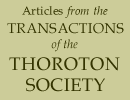< Previous
The Late Mr. George Fellows.

THE Council of the Thoroton Society cannot allow the death of Mr. George Fellows, which took place on the 13th of August last, to pass without notice. To Mr. Fellows the Society owes much. He became a member at its formation ; for several years he was on the Council, and, after a period of joint secretaryship with the late Rev. J. Standish, he was invited in 1906 to take the post of Honorary Secretary of the Society. From that date until his resignation in 1920, when he left Nottingham, Mr. Fellows rendered it most valuable service. Having a warm interest in archaeology generally, and a sound knowledge of certain branches of it, he brought both to bear on the discharge of the duties he had undertaken, while his business habits and experience, and his wide acquaintance with the residents in city and county alike, were of the utmost benefit to the Society.
Mr. Fellows came of a family that had been associated with Nottingham and the county for upwards of two hundred years. At one time its members were the leaders in the local hosiery and silk manufacture, and upwards of one hundred years ago, Mr. Fellows' grandfather established the banking business of Fellows, Mellor & Hart, afterwards Hart, Fellows & Co., which was for so long one of the best known private banking firms in the Midlands. Mr. Fellows himself played an active part in the life of city and county as banker, treasurer of the City of Nottingham, Justice of the Peace for the county, member of the County Council, Major in the South Notts. Yeomanry Cavalry, and a valued adviser on many charitable committees. He was a keen student of heraldry, possessing a very complete knowledge both of its history and practice, and was well versed in the kindred subjects of arms and armour, and monumental effigies. He was a frequent contributor to the Transactions of this Society, and in addition published a "History of the South Notts. Yeomanry Cavalry," and a valuable work entitled "Arms, Armour, and Alabaster Round Nottingham."
To his activities and accomplishments in all these ways, he added no little taste and skill as an artist, and pictures from his brush found a place on the walls of many Art Exhibitions.
This is perhaps not the place to speak of memories of private friendship, and of his personal and public worth, but we should indeed fail in our duty if we omitted to record in these pages our grateful recognition of all that the Thoroton Society as a body, and so many of its members individually, owe to Mr. Fellows.
< Previous
